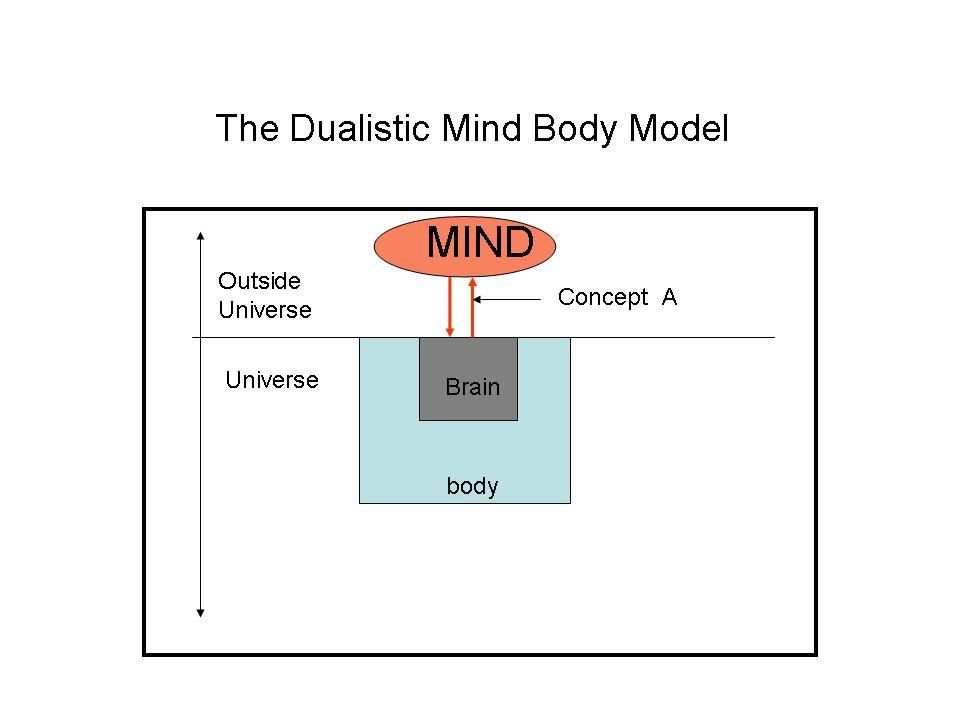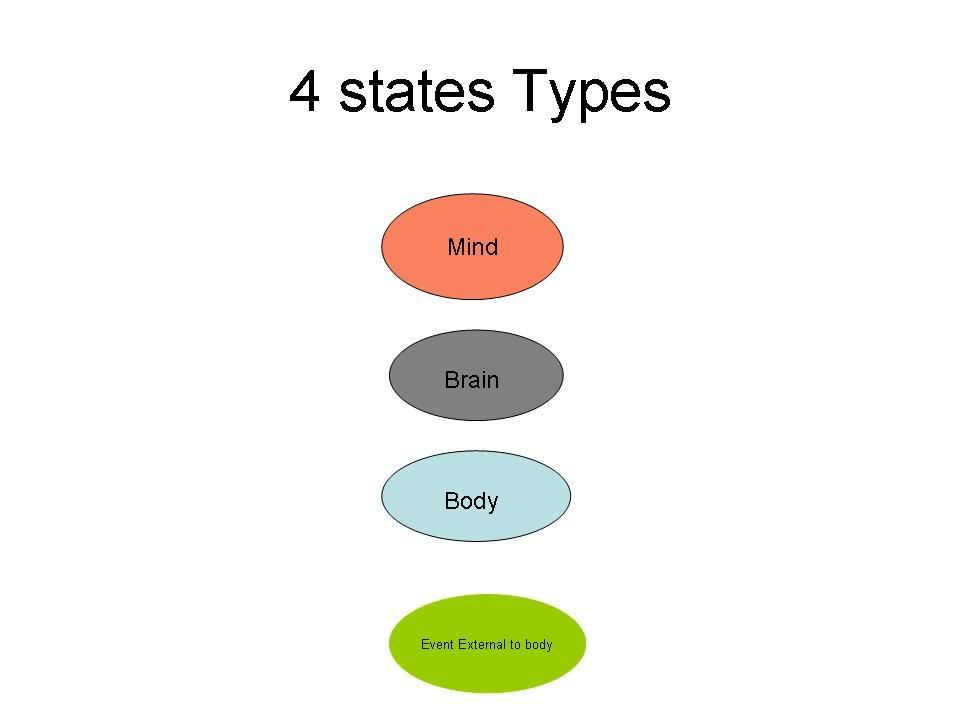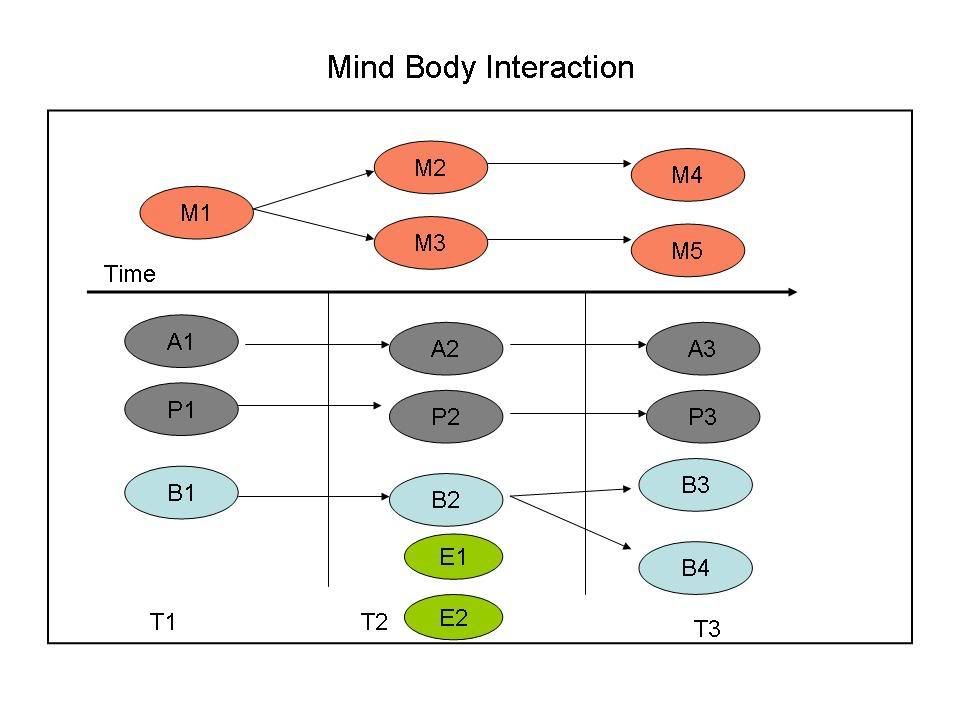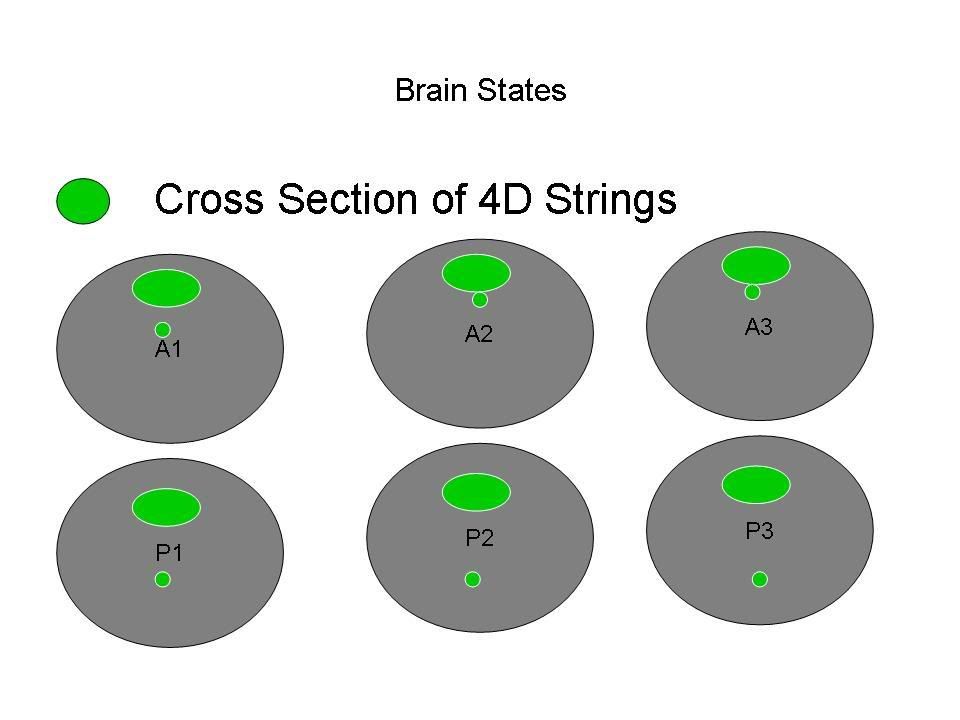I guess I need to say God can always influence events in ways that go completely in contradiction to the Laws of nature as When Jesus walked on water. Yet the greatest gift that Christ gave us, that is atonment for our sins by dying on the cross was done completely in perfect harmoney with all natural laws. So while God can influence ivents supernatural ways, I believe God can also influence events without the violation of natural laws.
The starting point for this concept that I am introducing is Free Will. Now when a person does an act of free will e.g Move their hand. From that persons perspective they seem to have had the complete freedom to make the choice and move or not move their hand.
However if you were to study all the states of the molecules that make up their body , it is highly likely that you would find that the hand had to move at the time it did. So then how is Free will possible?
Consider the following:

Deterministic Universe and Concept A
The principle of causation says that given the state of the universe at any given instant in time, its state to the future of this instant or to its past is determined. (Ref 2 section 2.5)
Every particle in the universe can be mapped by 3 coordinates of space and 1 Dimension of time. In this way the whole universe across all time and space can be seen to be a 4 Dimensional structure. Consider changes to this structure that act across space and time in all directions. As shown in Fig 1 such changes will change the shape but it will not violate the principle of causation. However one of the key properties of such changes is that it will change the past as well as the future. A influence that can bring about such changes will be called Concept A.

Fig 2 shows the effect of a concept A type change to a system consisting of a particle oscillating with a constrained boundary. Applications of a concept A type change at a given point will result in a change in amplitude and frequency of oscillation not just to the future but also to the past.
An aid to visualising Concept A type changes.

Consider the passage of a particle (e.g Molecule) over time. Considering that its size is small it will look similar to a 4 dimensional string. Consider many such particles colliding with each other etc. This will look like many string entangling with each other at collisions. Now picture the effect of pulling at any one of these strings (Fig 3). It will also move the rest of the strings not just to the future but also to the past.
Dualistic model of the Mind body problem and concept A
In Descartes Dualistic model of the Mind /Body interaction the mind is taken to be non-material.(ref 2 chapter 2) It can be taken to be outside the 4 Dimentional material body. Situated as such it will be in a position to bring about concept A type changes to the body. This would be exactly what is needed for Free Will. As Concept A type changes allow a change to the future of a given state by also changing the past. The problem that the dualistic view had with the deterministic universe was, on how the mind can bring about change to the body without violating the principle of causation. This is precisely what a Concept A type change allows. It can change the course of events into the future without violating the principle of causation as it also changes the past.So if I judge that the wax is or exits from the fact that I see it, it certainly follows much more clearly that I am or that I exit myself from the fact that I see it
Rene Descartes
E. J Lowe has proposed a similar concept as stated in ref 2 section 4.5 The self accounts for the character of bodily motions not by initiating causal chains, but by making it the case that those causal chains have the particular shape they have.
Evidence of Concept A
Time Reversal experiments
//www.boundary.org/articles/timereversed.pdf
In these experiments a subject is shown 2 types of pictures. One is calm scenic pictures (type A) while the other is anxiety raising frightful (type B) pictures. The procedure is that the subject is asked to press a button that will trigger the appearance of one of the types of pictures. The subject has no indication of what type of picture will appear. It is found that the state of the subject before type B picture is different to type A pictures. This is as is to be expected with concept A as when the subject sees the type B pictures it will make the subject use its free will to alert itself. The using of its Free will (Concept A) results in a change to the past. Thus the immediate past before these pictures (type B) will be different to that with regards to type A.
Libet Experiment
In this experiment a person is asked to press a button at anytime they like. The
persons brain activity is constantly monitored. It has been found that before the person makes a decision to press the button there is brain activity (known as readiness potential) related to initiating the pressing of the button. This is as expected of free will via concept A as a change at any given time to will not only bring a change to the future but will also result in a small change to the past.
Suggested Variation to Libets Experiment to complete proof
Further proof for concept A can be got by doing a slight variation to
Libets experiment. If a light is flashed at random intervals and the subject is asked
to press or not press the button as he/she wills on seeing the light. He/she is free to make up his/her mind as to what he/she will do at the next light flash at anytime but does so only at the light flash. Then under these conditions if a readiness potential is
detected prior to the time of the light it will prove the existence of concept A.
Evidence from the very experience of consciousness
Consider the experience of vision at any given instant. While we focus our attention on an object of vision, we are still aware of a background and, thus, a whole collection of events. This would mean at least an equal collection of simultaneous physical events in the brain are involved. Now the very act of awareness creates a connection between these events. If in truth these events are simultaneous, then nothing material can make such a connection as Special relativity states that there can be no connections between simultaneous events. As such if consciousness is taken to be exactly as experienced it would then also point to the mind being outside the 4 Dimentional material universe.
picture 1 The Dualistic Model of Mind-Body with Concept A

Picture 2 Key used in Diagrams

Picture 3 Mind - Brain - Body -External Events State Changes
M1 = I dont know when external event(E1,E2) will happen
M2 = I will Press Button
M3 = I will not press Button
M4 = I have pressed button
M5 = I have not pressed button
B3 = Button is Pressed
B4 = Button is not Pressed
E1,E2 external event at which point I make choice.

Picture 4 Brain States Magnified to show String Plucking

Conclusion
The principle of causation will not be violated if a changes to the future involve also changes to the past. This is what is seen in time reversal experiments. This fits well with what would be expected of a dualistic model of the mind body problem. As in such a model a non material mind can change the future by also changing the past.
References
//www.boundary.org/articles/timereversed.pdf
1. Bierman, D. J. & Radin, D. I. (1997). Anomalous anticipatory response on randomized future conditions. Perceptual and Motor Skills, 84, 689-690.
2. John Heil (2006) Philosophy of Mind, Routledg Contemporary Introduction to Philosophy.